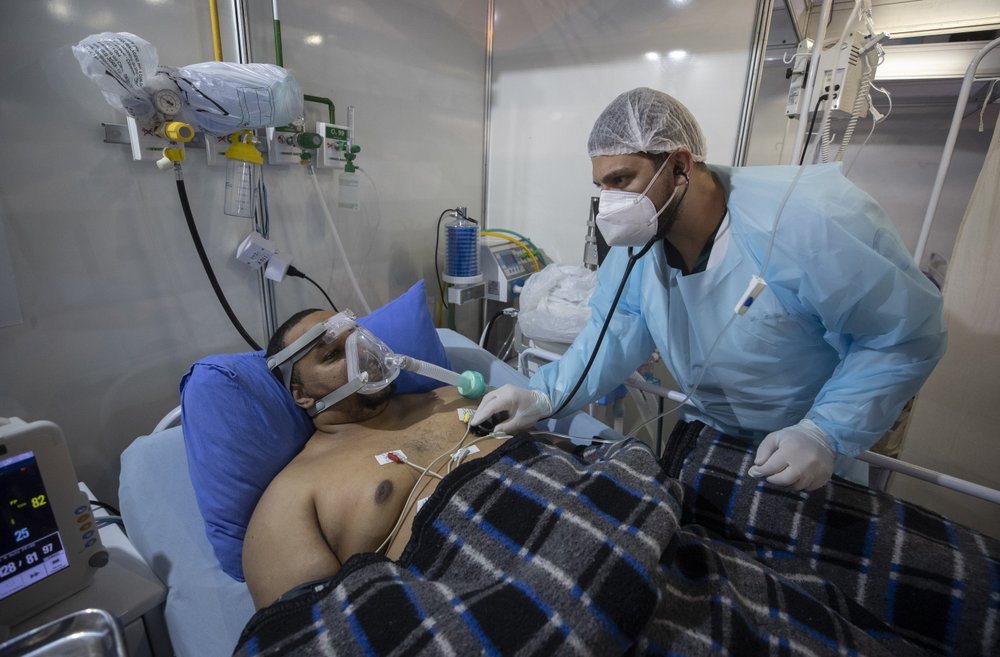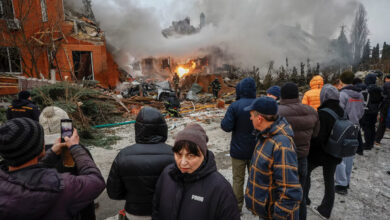
MADRID — Spain’s prime minister says his government is maintaining its goal of immunizing 70% of the nation’s adult population, some 33 million people, by the end of the summer despite the delay in the European rollout of the Johnson & Johnson vaccine.
Spain was expecting to receive 300,000 doses of the Janssen vaccine on Wednesday, the first delivery of the jab produced by Johnson & Johnson. The country wants to prioritize people aged between 70 and 79 to receive the single-dose vaccine.
But those plans had to be put on hold after the pharmaceutical company delayed delivery of the vaccine to European countries following the decision by the U.S. Food and Drug Administration to pause the shots in the United States to investigate possible links to very rare blood clots.
The hold up comes after various delays in shipments of other vaccines and a similar blood clot scare with the AstraZeneca vaccine that led Spain to limit it to people over 60 years old.
Prime Minister Pedro Sánchez, however, told Spain’s Parliament on Wednesday that “the pace of vaccination is going to accelerate in the month of April and (…) we will meet out goal.”
___
HERE’S WHAT ELSE IS HAPPENING:
BERLIN — German health authorities are recommending that people younger than 60 who have already received one shot of the AstraZeneca vaccine use a different vaccine for their second dose over concerns of blood clots.
The Health Ministry said Wednesday that it was recommending that people in that category receive as their second shot either the Pfizer/BioNTech or Moderna vaccination, both of which were developed using a different process.
It says, however, that in individual cases younger people wanting a second AstraZeneca shot can get one so long as they have a careful medical risk assessment. That also applies to high-risk people under the age of 60 still awaiting their primary vaccination.
The reports of rare blood clots in some people who’ve received the vaccine prompted Germany and several other countries in the 27-nation European Union to limit the AstraZeneca shots to older age groups, who are more at risk from serious illness when infected with COVID-19.
____
CANBERRA, Australia — Australia’s trade minister will fly to Europe to argue against export restrictions on COVID-19 vaccines as the nation attempts to accelerate its inoculation rollout.
Trade Minister Dan Tehan leaves on Thursday for Geneva, Berlin, Brussels, Paris and London with vaccine supply added to a post-Brexit trade deal agenda.
“The first idea I’ll be bringing to the table is that export restrictions aren’t the way to go,” Tehan told Australian Broadcasting Corp. on Wednesday.
Deliveries of the AstraZeneca vaccine to Australia were 3 million doses behind schedule, he said.
Australia is rethinking its vaccine rollout after the nation’s health authorities advised last week that Pfizer was now the preferred option for people younger than 50 because of a potential risk of rare blood clots linked to the AstraZeneca shot.
The government also abandoned its target of delivering at least one dose of either vaccine to all eligible adults among a population of 26 million by October.
But Prime Minister Scott Morrison said on Wednesday offering all Australian adults at least one vaccine dose by the end of 2021 was a possibility if international supply lines remained open.
The European Union last month blocked a shipment of more than 250,000 AstraZeneca doses from Italy to Australia because the need for them was not considered great enough in a country largely successful in containing the coronavirus.
___
SEOUL, South Korea — South Korea has recorded its highest daily jump in new COVID-19 infections in about three months, as officials urge the public to maintain vigilance.
The Korea Disease Control and Prevention Agency said Wednesday it’s confirmed 731 new cases over the past 24 hours. They brought the country’s total to 111,419 with 1,782 deaths.
The spike comes amid criticism of a slow vaccine rollout while people are increasingly venturing outdoors to take advantage of good weather.
Senior health official Yoon Taeho says an increased mobility last weekend was proof that South Korea’s public vigilance has loosened, and that elevating social distancing rules will be discussed in the next few days.
___
HELENA, Mont. — Montana Gov. Greg Gianforte has issued an executive order banning the development or use of vaccine passports in Montana.
Vaccine passports are documents that could be used to verify coronavirus immunization status and allow inoculated people to more freely travel, shop and dine.
The move by Gianforte on Tuesday comes as vaccine passports have drawn criticism as a heavy-handed intrusion into personal freedom and private health choices. Gianforte says in a statement that he encourages all Montana residents to get vaccinated but that it is “entirely voluntary.”
Vaccine passports have been implemented in New York but the White House has said there will not be any federal vaccine passport program.
___
HOLLAND, Mich. — A western Michigan restaurant owner who spent four nights in jail for violating coronavirus-related orders is firing back weeks later with a demand that $15,000 in fines be refunded and contempt findings dropped.
An attorney for Marlena Pavlos-Hackney said her rights were violated during a contentious court hearing on March 19.
State regulators yanked Pavlos-Hackney’s food license in January for serving indoor diners and breaking other rules related to preventing the spread of COVID-19. But the restaurant, Marlena’s Bistro and Pizzeria in Holland, stayed open in defiance.
Pavlos-Hackney refused to turn herself in to face a contempt hearing. She was arrested and spent four nights in jail until authorities were convinced that her restaurant would stay closed.
Attorney Robert Baker, who wasn’t hired until Pavlos-Hackney was arrested, said a judge questioned her without recognizing that she had a lawyer. He said there was “no testing of any evidence” or an opportunity to cross-examine or produce witnesses.
A message seeking comment was sent to the attorney general’s office.
___
AMSTERDAM — The Dutch government has presented a roadmap for relaxing coronavirus lockdown measures, but caretaker Prime Minister Mark Rutte is stressing that it is still too early to ease restrictions.
In a nationally televised press conference Tuesday, Rutte said hospitals in the Netherlands are as crowded with COVID-19 patients now as they were during the first wave of the pandemic last year and that it would be irresponsible to relax the country’s months-long lockdown now.
The government had previously said it hoped the first relaxation could have started April 21, but Rutte said that was too soon.
Earlier Tuesday, the Dutch public health institute said the number of new coronavirus infections rose 6% over the past week to 51,240, with the largest increase in positive tests recorded among children aged 13-17 years.
The increase comes despite the months-long tough lockdown in the Netherlands including a nighttime curfew, closed bars and restaurants and shuttered public institutions like museums and zoos.
___
WASHINGTON — U.S. health insurance customers may receive higher premium rebates than normal later this year partly because insurers had less care to cover after COVID-19 arrived in 2020.
Some individual insurance customers could receive premium credits or rebates of nearly $300 on average, according to an analysis of government data from the non-profit Kaiser Family Foundation.
The Affordable Care Act requires insurers to give customers refunds or premium credits if they don’t spend certain percentages of the premiums they collect on care and costs related to it.
Kaiser’s analysis noted that last year hospitals and other care providers canceled surgeries and non-essential care early in the pandemic and then during subsequent COVID-19 spikes.
Kaiser Vice President Cynthia Cox said nearly half of customers in the individual market receive these annual rebates. Some people with employer-sponsored coverage also may get rebates that they share with their company.
Rebate totals will be finalized later this year. They generally are then delivered by the end of September. The totals will vary by market and depend on factors like whether an insurer has already offered premium breaks to counter the drop in care.
___
WASHINGTON — The nation’s capital city joined a growing list of states in suspending the Johnson & Johnson COVID-19 vaccine that’s become the focus of a federal examination of rare blood clots.
District of Columbia health director Dr. LaQuandra Nesbitt says she’s not aware of any cases of dangerous blood clots among the 16,000 Washingtonians who had received the J&J one-dose vaccine before the temporary halt recommended by federal health authorities.
“This pause means that the system is working properly,” Nesbitt says.
Dr. Anthony Fauci, the nation’s top infectious disease expert, echoed Nesbitt, saying Americans who’ve recently received a Johnson & Johnson COVID-19 vaccine shouldn’t be anxious about the pause. Fauci called it a “testimony to how seriously we take safety.”
J&J said in a statement Tuesday it was aware of the reports of blood clots, but that no link to its vaccine had been established.
A CDC committee will meet Wednesday to discuss the cases. The FDA has launched an investigation into the cause of the clots and low platelet counts. There have been six reported clots among the 6.8 million shots administered.
U.S. health authorities cautioned doctors against using a typical clot treatment, the blood-thinner heparin. “In this setting, administration of heparin may be dangerous and alternative treatments need to be given,” the FDA and CDC say.
Washington state, Idaho, California, Alabama, Wisconsin, Colorado, Nevada and Alaska are among the states that have temporarily halted or have recommended pausing the use of the Johnson & Johnson shot amid the investigation.
___
BERLIN — South Africa has suspended giving the Johnson & Johnson vaccine as a “precautionary measure” following the FDA decision in the U.S. to pause the use of the vaccine while rare blood clots are examined.
All six cases were in women between ages 18 to 48, including one who died. The unusual clots occurred six to 13 days after vaccination.
South Africa has given more than 289,000 shots of the J&J vaccine to the country’s health workers without any reports of blood clots, Health Minister Dr. Zweli Mkhize says.
He says South Africa is halting the use of the J&J doses “out of an abundance of caution.” He expects the questions regarding the J&J vaccine should “be cleared within a matter of days.”
Recently, the blood clot reports prompted several European Union countries in the 27-nation bloc to limit the AstraZeneca vaccine to older age groups.




